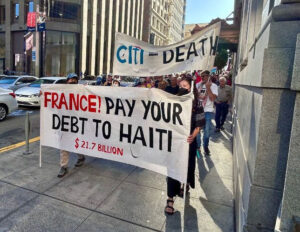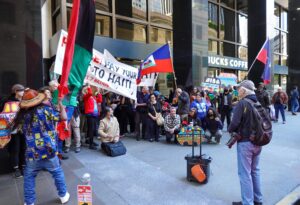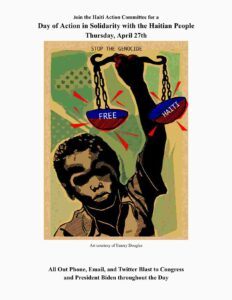Haiti: Reparations Yes! Deportations No! Counterpunch, June 19, 2025
The calls from Haiti have echoed around the world: “France, Pay Your Debt To Haiti!”

Demonstrators from Haiti to France to San Francisco, London, Belize, and Jamaica have demanded that France pay for the ransom it extracted from Haiti 200 years ago as the price for its independence and for the “crime” of freeing itself from slavery.
On January 1, 1804, after a successful revolution, the Haitian people emancipated themselves from slavery and colonialism, becoming the first nation in the world to permanently ban slavery. The Haitian flag– adopted by revolutionaries on May 18, 1803– now flew freely.
The newly independent Haitian government offered asylum to anyone of African descent who escaped slavery, as well as people of indigenous origin. In his landmark 2016 article, “Our Debt to Haiti,” Caribbean scholar and historian Sir Hilary Beckles wrote of how Haiti welcomed Africans who escaped slavery in Jamaica:
“All of us in Jamaica, more than any other people, owe the greatest political and civic debt to Haiti… This year is the 200th anniversary of the grand, epic landing of ‘sail-away’ Jamaicans in Haiti – the first black Jamaicans to be declared free and citizens of Haiti by the personal intervention of a president…This is what happened exactly 200 years ago. Jamaica is bursting at the seams with 300,000 enslaved Africans. Haiti is the only true land of the free and the brave, having defeated in battle the enslavers of France, Britain, and Spain before becoming, in 1804, the first free state in the Western world. President Dessalines enshrined within the 1805 national constitution the most humane and politically powerful provision: any enslaved person of African descent who arrives on the shores of Haiti is automatically freed and a citizen of Haiti.”
Moreover, the Haitian government offered material support to freedom fighters and liberation movements throughout the Americas, including Simon Bolivar, on the condition that they abolish slavery should they come to power. The revolutionary leadership that Haiti provided in the global fight against white supremacy has been consistently acknowledged by Black revolutionaries in the US, including the late Kwame Ture (Stokely Carmichael), as seen in this powerful speech. Haiti’s international solidarity also extended to struggles within Europe, with Haiti becoming the first nation to officially recognize Greece’s fight for independence in 1822.

Confronted by a real challenge to their order, the imperial powers reacted violently. In 1825, the French government sent warships to force the Haitians to pay their former French enslavers 150 million gold francs for their “lost property” or face an invasion. The US government backed up the French extortion and did not even recognize Haiti as a nation until 1862, during the US Civil War. In 1915, US Marines invaded and occupied Haiti, with the US government and Citibank directly taking over the debt collection from France. Paying off this “debt,” which amounted to approximately $115 billion, impoverished Haiti. This massive plunder has been called the greatest heist in history and is well-documented in the recent NYT article “The Root of Haiti’s Misery: Reparations to Enslavers”.
In 2003, the democratically elected and popular Haitian President Jean Bertrand Aristide demanded that France pay restitution. Nine months later, on February 29, 2004, he was overthrown in a violent coup orchestrated by France, the US, and Canada.
On this 200th anniversary of the ransom, actions and events have been held in numerous countries demanding restitution and reparations to Haiti from the French government.

In San Francisco, the Haiti Action Committee (HAC) staged a vibrant protest on May 20, 2025, in front of the Citibank building and then marched to the French consulate. A wide range of Bay Area progressive organizations participated in the action. Pierre Labossiere, a co-founder of the Haiti Action Committee and a long-term Haitian American activist, spoke of the significance of this protest honoring Haitian Flag Day:
“May 18 was the date of a Congress when the various Maroon leaders and the various enslaved folks were taking their freedom. They came together to decide on a future, on what the future of the country was going to be… They decided that this was no longer a fight just for the abolition of slavery, which it was, but more so important it was a fight to free the land, so that the people of Haiti could take the land they had been working and slaving over and shed so much blood and tears and made the land rich and France rich… They said they are kicking out the colonizers and taking their freedom.”
Robert Roth, another co-founder of HAC and a long-term anti-imperialist activist, explained the significance of protesting in front of the Citibank building:
“As the first payment on that onerous, predatory debt [extracted by France], Haiti had to close its nascent public school system. In the end, if you include the commissions that French banks and this bank [Citibank] forced Haiti to pay, the interest on loans that never really reached Haiti, the New York Times estimates that Haiti, in the end, had to pay $115 billion. That is why we say that Haiti is a country rich in both natural and human resources that has been made poor by foreign plunder.”
Win-Mon Kyi, a member of the Myanmar Student Young, made the connections between the struggle in Myanmar and the struggle in Haiti:
“On Haitian Flag Day, we want to say – from the Myanmar Student Union to the liberation of Haiti – that we raise our fists with you, we raise our flags with you, and that we are rooting for both of our struggles to achieve victory because we see that our struggles are one and the same.”
Akubundu Amazu, an organizer with the All-African People’s Revolutionary Party, spoke about the anti-colonial governments in power in the Sahel region of Africa, the measures they are taking to “free the land,” and the connection with the Haitian Revolution:
“The Alliance of Sahel States is encouraging… they told the French to go. What’s the first thing that the people did? They seized their natural resources. Look, if we got uranium, why does the Eiffel Tower got all the lights and we’re stuck here with candles? It’s absurd. And so when they kicked them out, they began their own production with the resources of Africa. The same with gold, coltan, and more. So we got fights going on throughout Africa. And I’m connecting Haiti to Africa because it is connected to Africa.”
In France, which has long dismissed calls to pay back Haiti, a non-binding resolution was submitted to the National Assembly on April 9, 2025, calling for restitution. After a strong demonstration by Haitians in France on May 3, the resolution was passed on June 5, 2025.
In London, the Global Women’s Strike held a protest in front of the French Embassy on May 20, 2025. In Belize, the UBAD Educational Foundation (UEF), led by activist YaYa Marin Coleman, continues to carry out popular education in solidarity with the Haitian people, producing this video to commemorate Haitian Flag Day. In Jamaica, there was a special screening of the film “Toussaint L’Ouverture” at the Bob Marley Museum on May 20, 2025, honoring the Haitian revolution.
Throughout Haiti, people are holding events to demand restitution, such as those organized by the University of the Dr. Aristide Foundation (UNIFA). Street market workers, students, women’s groups, peasants, workers, educators, healthcare workers, and community self-defense brigades are all advancing grassroots resistance, together with Fanmi Lavalas, the political party of the poor majority.
These actions could not come at a more critical moment. Today in Haiti, there is what grassroots activists call a “slow-motion genocide.” Paramilitary death squads, equipped with U.S.-made weapons and funded by sectors of the Haitian elite and the right-wing Tet Kale Party (PHTK), are being smuggled in from the U.S. Massacres and systematic rape are relentless. More than 1.3 million people have been internally displaced, and more than half of the population, 5.7 million people, are facing acute hunger. There is not a single elected official left in the entire country.
Added to this, the Trump administration now threatens to send at least half a million Haitian refugees back to these conditions by the end of the summer, as it has ended Temporary Protected Status for Haitians, as well as the so-called “humanitarian parole program” initiated by the Biden Administration. Trump has also imposed a travel ban on Haiti, one more way in which he has targeted Haitians. The spectre of ICE and deportation now looms over the entire Haitian community in the United States.

At the San Francisco demonstration, Judith Mirkinson with the Haiti Action Committee summed up the day: “As anti-racists, anti-colonialists and those fighting against the draconian Trump administration, solidarity with Haiti has to be integrated into all our work”.
Our demands for solidarity are clear:
FRANCE, PAY YOUR DEBT TO HAITI!
END THE DEPORTATIONS! STOP THE FLOW OF WEAPONS INTO HAITI!
For more information, visit www.haitisolidarity.net or facebook.com/HaitiActionCommitte.
You can email Haiti Action Committee at: action.haiti@gmail.com
And to support the vital work of Haiti’s grassroots movement, please donate to the Haiti Emergency Relief Fund at www.haitiemergencyrelief.org

